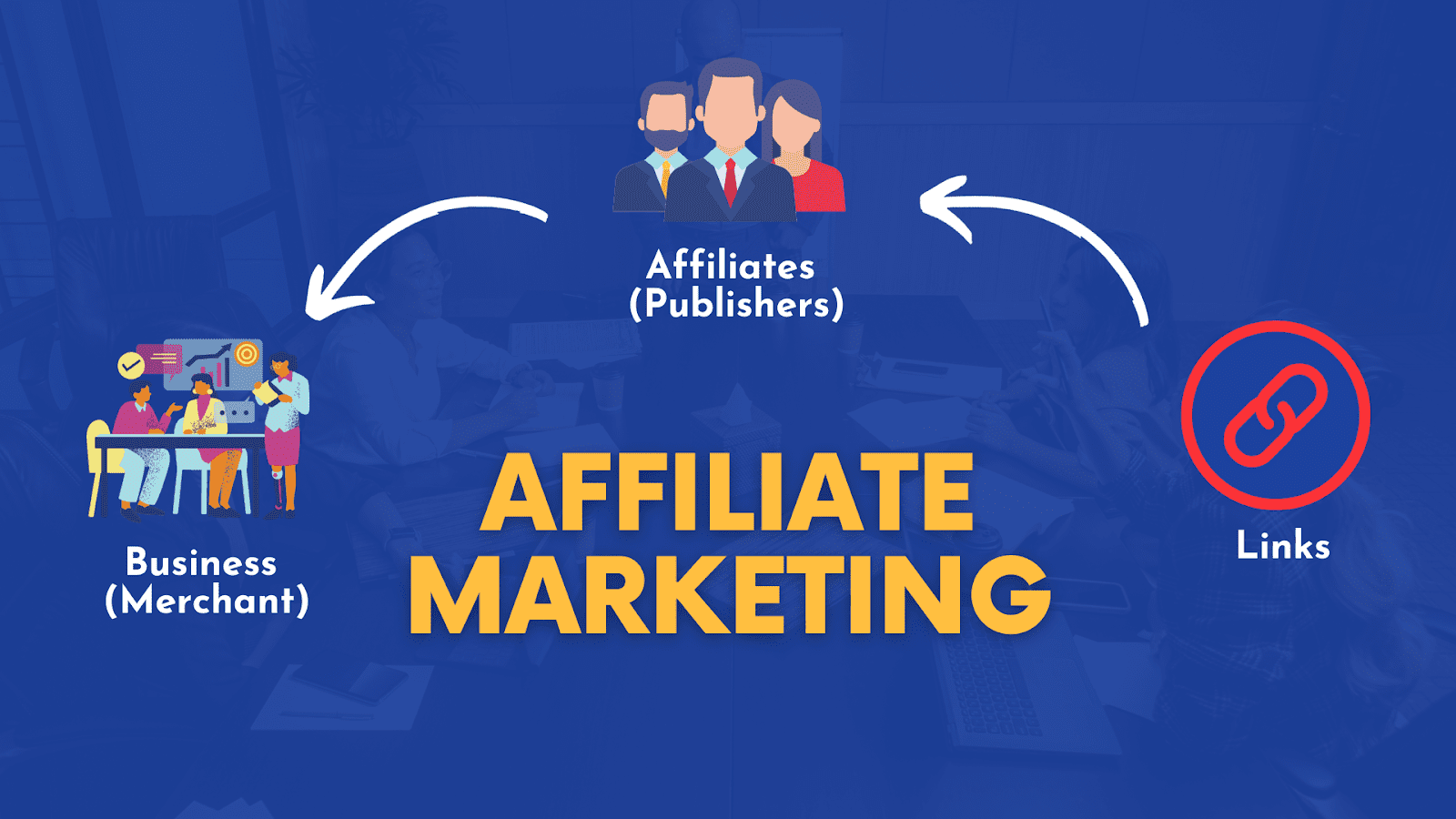Affiliate Marketing vs Digital Marketing: Key Differences Explained

The success of any business can be directly attributed to marketing’s efforts. Two popular marketing strategies that have gained significant attention are affiliate marketing and digital marketing. Affiliate Marketing vs. Digital Marketing, these two terms must still be confusing to a lot of people. While both aim to promote products or services, they differ in their approach and execution.
In this article, we will delve into the world of affiliate marketing and digital marketing, exploring their key differences, benefits, drawbacks, and similarities. By understanding these nuances, you can make an informed decision on which strategy suits your business needs.
Understanding Affiliate Marketing
What is Affiliate Marketing?
Affiliate marketing is a performance-based marketing strategy where businesses reward affiliates for each customer or sale they bring through their marketing efforts.
Affiliates, also known as publishers or partners, promote products or services through various digital channels such as websites, blogs, social media, or email marketing. They earn a commission for each successful referral made. This mutually beneficial relationship between businesses and affiliates has gained immense popularity due to its cost-effectiveness and potential to reach a wider audience.
Affiliate marketing offers a flexible and scalable approach to marketing. It allows businesses to tap into the expertise and influence of affiliates, who have established a loyal following or possess niche-specific knowledge. This strategy enables businesses to target specific customer segments effectively and leverage the trust built by affiliates with their audience. By partnering with affiliates, businesses can drive traffic, increase brand awareness, and ultimately boost sales.

What does affiliate marketing involve?
Here’s a detailed breakdown of what each component involves:
1. Business or Merchant:
The business, also known as the merchant or advertiser, is the entity that offers products or services and seeks to promote them through affiliate marketing. The merchant relies on affiliates to help drive traffic, leads, or sales for their products or services.
2. Affiliates or Publishers:
Affiliates, often referred to as publishers, are individuals or entities that partner with the business to promote its products or services. These affiliates act as independent marketers who leverage their online presence, content, or marketing channels to reach potential customers.
Affiliates can take various forms, including bloggers, website owners, social media influencers, content creators, email marketers, coupon sites, and more. They join affiliate programs offered by businesses that align with their niche or target audience.
Affiliates earn commissions or rewards for driving specific actions or outcomes, which can include:
-
Pay-Per-Sale (PPS) or Cost-Per-Sale (CPS): Affiliates receive a commission when a referred customer makes a purchase.
-
Pay-Per-Lead (PPL) or Cost-Per-Lead (CPL): Affiliates earn a commission when a referred visitor takes a specific action, such as signing up for a newsletter or filling out a contact form.
-
Pay-Per-Click (PPC) or Cost-Per-Click (CPC): Affiliates earn a commission based on the number of clicks generated through their referral links, regardless of whether those clicks result in sales or leads.
Affiliates are responsible for creating and promoting content that drives traffic to the merchant’s website, encouraging users to take desired actions, and optimizing their marketing efforts to maximize conversions.
3. Affiliate Links:
Affiliate links, also known as tracking links or referral links, are unique URLs provided by the merchant to affiliates. These links contain tracking parameters that allow the merchant to monitor and attribute the traffic and conversions generated by each affiliate.
When users click on an affiliate’s referral link and subsequently make a purchase, sign up, or perform another desired action on the merchant’s website, the tracking link records this activity. This tracking ensures that the affiliate receives proper credit for the referral.
Affiliate links may include additional information, such as affiliate IDs or campaign identifiers, to help merchants identify the source of the referral and calculate commissions accurately.
Benefits and Drawbacks of Affiliate Marketing
Benefits of Affiliate Marketing
- Cost-effective: Businesses only pay affiliates when they generate sales or leads, making it a cost-effective marketing strategy.
- Wider Reach: Affiliates have established audiences, allowing businesses to tap into new customer segments and expand their reach.
- Targeted Marketing: Affiliates often have niche-specific knowledge, enabling businesses to target specific customer segments effectively.
Drawbacks of Affiliate Marketing
- Limited Control: Businesses have less control over how affiliates promote their products or services, which can affect brand messaging and reputation.
- Variable Performance: Affiliate marketing relies on the performance of affiliates, which can vary based on their marketing strategies and audience engagement.
- Commission Payments: Managing commission payments to multiple affiliates can be time-consuming and complex.
Exploring Digital Marketing
What is Digital Marketing?
Digital marketing encompasses a wide range of strategies aimed at promoting products or services through digital channels. Unlike affiliate marketing, digital marketing is not solely performance-based and includes various techniques such as search engine optimization (SEO), social media marketing, content marketing, email marketing, pay-per-click (PPC) advertising, and more.
Digital marketing focuses on building a strong online presence, driving organic traffic, and engaging with customers through various touchpoints. It involves creating targeted campaigns, optimizing websites for search engines, curating valuable content, and leveraging social media platforms to foster brand loyalty and awareness. The goal of digital marketing is to attract, convert, and retain customers while establishing a long-term relationship with them.
Digital marketing offers businesses the opportunity to reach a broader audience and gain visibility in the digital landscape. By utilizing different channels and strategies, businesses can tailor their marketing efforts to suit their target market and drive relevant traffic to their website or online storefront. This comprehensive approach allows businesses to establish themselves as industry leaders, create brand recognition, and ultimately increase their revenue.

What does Digital Marketing involve?
Digital marketing refers to a variety of methods and approaches used to promote products, services, or brands via digital platforms. Some essential components of digital marketing, such as content marketing and email marketing, are as follows:
Content Marketing
Content marketing is a strategic approach focused on creating and distributing valuable, relevant, and consistent content to attract, engage, and retain a target audience. This content can take various forms, including blog posts, articles, videos, infographics, podcasts, and ebooks. The primary goal of content marketing is to provide information, address the needs of your audience, and build trust, ultimately driving customer loyalty and conversions.
Search Engine Optimization (SEO)
SEO is a set of techniques and strategies aimed at optimizing your website’s content, structure, and technical aspects to improve its visibility and ranking in search engine results pages (SERPs). This involves keyword research, on-page optimization, backlink building, and technical SEO to enhance organic (unpaid) traffic from search engines like Google. The ultimate objective is to ensure your website appears prominently when users search for relevant keywords and phrases.
Magento SEO Services
by Mageplaza
Let experienced professionals optimize your website's ranking
Learn moreSocial Media Marketing
Social media marketing involves leveraging various social media platforms such as Facebook, Instagram, Twitter, LinkedIn, and others to connect with your target audience, establish brand presence, and engage users through a mix of organic content and paid advertising. It includes creating and sharing posts, images, videos, and ads to foster brand awareness, build a community, and drive website traffic or conversions.
Email Marketing
Email marketing is a direct communication channel that entails sending targeted and personalized emails to subscribers, including leads and existing customers. These emails serve various purposes, such as nurturing leads, promoting products or services, sharing valuable content, and announcing special offers. Email marketing is instrumental in building and maintaining customer relationships and driving conversions.
Pay-Per-Click (PPC) Advertising:
PPC advertising is a form of online advertising where businesses pay a fee each time a user clicks on their ads. It’s commonly used on search engines like Google (Google Ads) and other platforms like Bing Ads. Advertisers bid on specific keywords or audience segments to display ads that link to their websites. PPC campaigns can be highly targeted and offer precise control over ad spend, making it an effective method for driving traffic and conversions.
Affiliate Marketing:
Affiliate marketing is a performance-based marketing strategy where businesses (merchants/advertisers) partner with affiliates (publishers) who promote their products or services. Affiliates earn commissions for driving desired actions, such as sales, leads, or clicks, through their marketing efforts. It’s a collaborative approach that expands reach and aligns incentives between advertisers and affiliates.
Influencer Marketing:
Influencer marketing leverages individuals with a significant online following, known as influencers, to endorse products or services. These influencers have established credibility and a loyal audience within specific niches. Brands collaborate with influencers to tap into their reach and influence, as their recommendations can have a powerful impact on their audience’s purchasing decisions.
Benefits and Drawbacks of Digital Marketing
Benefits of Digital Marketing
- Targeted Advertising: Digital marketing allows businesses to target specific customer segments based on demographics, interests, or online behavior.
- Measurable Results: With digital marketing, businesses can track and measure the success of their campaigns in real-time, allowing for data-driven decision-making. Brand Building: Digital marketing enables businesses to establish a strong online presence and build brand recognition through consistent messaging and engagement.
Drawbacks of Digital Marketing
- Upfront Costs: Digital marketing often requires upfront investment in advertising campaigns or hiring professionals to manage various strategies.
- Competition: The digital landscape is highly competitive, making it challenging for businesses to stand out and capture the attention of their target audience.
- Constant Adaptation: Digital marketing strategies and platforms evolve rapidly, requiring businesses to stay updated and adapt their strategies accordingly.
Key Differences between Affiliate Marketing and Digital Marketing
Now, you have a base knowledge of Affiliate Marketing vs. Digital Marketing. Above is a quick comparison of affiliate marketing and digital marketing:
| Characteristic | Affiliate Marketing | Digital Marketing |
|---|---|---|
| Definition | Affiliate marketing is a type of digital marketing where a business rewards its affiliates for bringing in visitors or customers through their own marketing efforts. | A broader term that encompasses all marketing activities that use digital channels to reach and connect with consumers. |
| Goals | Increase brand awareness, generate leads, drive sales, promote products or services. | Increase brand awareness, generate leads, drive sales, promote products or services, build customer relationships, improve customer satisfaction, etc. |
| Target audience | Consumers who are interested in the products or services that the affiliate is promoting. | Consumers who are interested in the products or services that the business is offering. |
| Channels | SEO, social media marketing, email marketing, PPC advertising, etc. | SEO, social media marketing, email marketing, PPC advertising, content marketing, influencer marketing, etc. |
| Measurement | Digital analytics tools can be used to track affiliate traffic, conversions, and commissions. | Digital analytics tools can be used to track website traffic, leads, sales, and other key metrics. |
While both affiliate marketing and digital marketing aim to promote products or services, they differ significantly in their approach and execution. Some key differences between the two strategies include:
Payment Structure
-
Affiliate Marketing: Affiliates are compensated on a performance basis, typically earning a commission for each successful referral or sale they generate. Advertisers only pay when desired actions occur.
-
Digital Marketing: Digital marketing often involves upfront costs for advertising, such as setting budgets for pay-per-click (PPC) campaigns, sponsored social media posts, or content creation. Advertisers pay for the placement and exposure of their marketing materials.
Control and Flexibility
-
Affiliate Marketing: Businesses have less control over the marketing process in affiliate marketing. Affiliates have the autonomy to choose how they promote products or services, and this can vary widely in terms of strategy and messaging.
-
Digital Marketing: Digital marketing provides businesses with complete control over their marketing campaigns. They can tailor messaging, targeting, and the overall strategy to align with their brand identity and specific customer segments.
Target Audience
-
Affiliate Marketing: Affiliates rely on their established audience, which may be niche-specific or have a loyal following. The audience is typically built by the affiliate themselves.
-
Digital Marketing: Digital marketing focuses on targeting a broader audience through various digital channels. Businesses can reach a wider range of potential customers, from different demographics and interests.
Risk and Cost
-
Affiliate Marketing: Affiliate marketing carries less risk for businesses. They only pay affiliates when affiliates generate sales or leads. There is little to no upfront cost, making it a performance-driven model.
-
Digital Marketing: Digital marketing often involves upfront costs for advertising, and there is a risk of investing in campaigns that may not yield immediate results. It may require a budget for ad spend, content creation, and marketing tools.
Relationship Building
-
Affiliate Marketing: Affiliate marketing carries less risk for businesses. They only pay affiliates when affiliates generate sales or leads. There is little to no upfront cost, making it a performance-driven model.
-
Digital Marketing: Digital marketing often involves upfront costs for advertising, and there is a risk of investing in campaigns that may not yield immediate results. It may require a budget for ad spend, content creation, and marketing tools.
Affiliate Marketing vs Digital Marketing: Is there any similarity between the two?
While affiliate marketing and digital marketing differ in their approach and execution, they do share some similarities:
- Promotion of Products or Services: Both strategies aim to promote products or services to a target audience, albeit through different channels and methods.
- Goal of Driving Sales: Ultimately, both affiliate marketing and digital marketing seek to drive sales and increase revenue for businesses.
- Importance of Targeting: Both strategies recognize the importance of targeting specific customer segments to maximize the effectiveness of marketing efforts.
- Utilization of Digital Channels: Both affiliate marketing and digital marketing leverage digital channels such as websites, social media platforms, and email marketing to reach their target audience.
Choosing the Right Marketing Strategy for Your Business
Choosing between affiliate marketing and digital marketing strategy for your business involves a thoughtful assessment of your unique circumstances and objectives. To make a well-informed choice, it’s essential to revisit the core principles of marketing like the 4Ps of Marketing — Product, Price, Place, and Promotion — which serve as the foundation for building any successful strategy. Here’s some guidance to help you make an informed decision:
Define Your Business Goals:
- Begin by clearly outlining your business goals and objectives. Are you primarily focused on increasing sales, brand awareness, lead generation, or something else entirely?
Understand Your Target Audience:
- Gain a deep understanding of your target audience. Who are your ideal customers? What are their preferences, behaviors, and pain points? Understanding your audience is crucial for effective marketing.
Evaluate Your Budget and Resources:
- Assess your marketing budget and the resources you have available. Determine how much you can invest in your marketing efforts in terms of both time and money.
Consider Your Competitive Landscape:
- Analyze your competition. What marketing strategies are your competitors using? Are there gaps or opportunities you can leverage?
Affiliate Marketing Considerations:
- If you are looking for a cost-effective way to reach a new audience and drive sales, affiliate marketing can be a great option.
- Evaluate whether your products or services align with the affiliate marketing model, where partners promote your offerings in exchange for commissions.
- Assess your ability to select and manage affiliate partners effectively.
- Consider how affiliate marketing fits into your broader marketing strategy and whether it can complement your goals.
A Complete Marketing Solution for Holiday Seasons
Discover an all-in-one marketing pack

Making the Right Choice for Your Business
Understanding the differences between affiliate marketing and digital marketing is vital for keeping up with the rapidly developing field of marketing. While affiliate marketing offers a cost-effective way to tap into existing audiences and expand reach, digital marketing provides businesses with control, scalability, and the ability to build a strong online presence. By analyzing your business goals, target audience, and available resources, you can choose the right marketing strategy that aligns with your objectives. Remember, there is no one-size-fits-all approach, and a combination of strategies may be the key to success in the competitive digital landscape.






